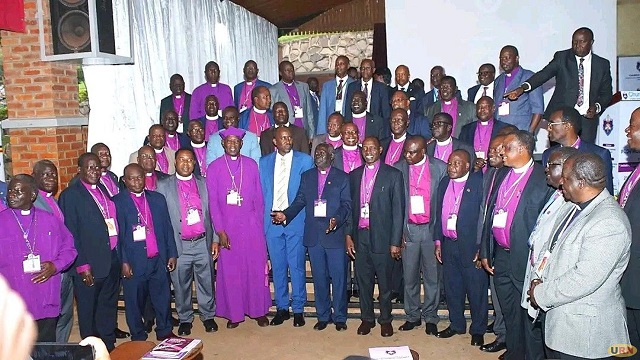
Kampala, Uganda | THE INDEPENDENT | Archbishop Samuel Steven Kaziimba Mugalu of the Church of Uganda has requested a postponement of the proposed amendments to the Provincial Constitution and Canons.
In his Charge to the 27th Provincial Assembly currently underway at Uganda Christian University, Mukono, Archbishop Kaziimba suggests that these changes be delayed until the Provincial Assembly has reviewed the results of a comprehensive study on the Province’s status.
“The Standing committee forwarded to this 27th Provincial Assembly a proposal to conduct a comprehensive study on the growth of the Province; this study will look at the governance structure of the province, creation of new dioceses etc,” said Dr Kaziimba-Mugalu. He added: “I have had a deep reflection on this process and I am of the considered view that the outcome of the study might necessitate further amendments to the Provincial Constitution and Canons.”
The Provincial Assembly is to address various issues related to the Church’s future and sustainability. The Archbishop emphasized that given the Assembly’s agenda and the potential for extensive debate on the proposed Constitutional and Canon amendments, it would be more practical to address these changes alongside other significant agenda items that are also expected to provoke substantial discussion.
“I therefore move the Provincial Assembly to second a proposal that; The current Provincial Constitutional Amendment and Canons review process be stayed, so that it can be handled after the Assembly has received the findings of the comprehensive study on the growth of the Province,” his charge adds.
Archbishop Kaziimba further proposed that the Provincial Assembly Standing Committee should commission a comprehensive study on the Province’s status, with clear terms of reference, by December 31, 2024. Following this, he added that an extraordinary Provincial Assembly should be convened to review and debate the draft amended Provincial Constitution and Canons alongside the study’s findings.
The amendments were initially suggested by the 26th Provincial Assembly to address various issues impacting the Church and to resolve inconsistencies between the Constitution and Canons.
A provincial committee was formed to draft these amendments and send them to diocesan synods for discussion prior to the Provincial Assembly. Key proposed changes include adjustments to the nomination, qualifications and retirement age of bishops, handling of marriage and divorce matters, expanding the Archbishop’s powers, and issues related to land ownership among others.
During the diocesan synods, many of the proposed amendments sparked controversy, leading to the rejection of most of the proposals and the passing of only a few with suggestions for modification. The synod resolutions were submitted to the committee, which subsequently compiled a report.
The committee’s report recommended amendments on at least 18 key issues. Among the primary recommendations was the establishment of the Constitution as the supreme law of the Church of Uganda.
“There is no provision that specifically provides for the status of the constitution and yet, in Canon 1:5, there is a provision for the government of Church of Uganda just out of the blue,” reads the rationale as submitted by the provincial standing committee.
The committee also addressed a longstanding and contentious issue concerning the nomination, qualification, and election of bishops, which has caused significant conflicts within the Church.
In various dioceses, including Kumi, Muhabura, Luweero, and Namirembe, disputes over bishop elections have led to some Christians rejecting nominated candidates and challenging elected bishops, sometimes resulting in legal disputes in civil courts—a situation that has drawn criticism from church authorities.
During the election of the Bishop of Namirembe, last year, concerns were raised by a group identifying itself as elders, who pointed out issues with the election process that needed resolution. To address these challenges and streamline the process, the committee proposed expanding the bishop nomination committee to include representation from the province.
“A bishop being a provincial officer and a potential archbishop, his or her nomination should therefore be both diocesan and provincial matter,” the recommendation from the standing committee reads in part and this has since been approved by the House of Bishops.
The proposal to include a provincial perspective in the bishop nomination committee has been a subject of debate since the adoption of the current Constitution in 1972 and has consistently been rejected over the years. For instance, a 1969 survey on Church administration and finance had recommended the creation of a Provincial Electoral College to vet nominations for bishop vacancies and work alongside the House of Bishops.
Meanwhile, a bishop, who preferred to remain anonymous told our reporters that for this proposal to be adopted, it must first be approved by the assembly. Additionally, there is another ongoing issue concerning the retirement age of bishops that remains unresolved.
“The House of Bishops agreed that at nomination the bishop should be at least 45 years of age as it is now but extend the age of retirement from 65 to 70. However, this cannot benefit us, the sitting bishops. This is also subject to discussion,” the bishop noted.
By the time of writing this story, delegates had adapted the Archbishop’s charge and divided into their respective houses—Bishops, Laity, and Clergy—to deliberate further on the proposed suggestions.
Should they approve these recommendations, the proposed amendments will not be debated in this assembly. However, if they reject the proposal, the amendments will be thoroughly discussed on Thursday, marking the second time in history that both the Constitution and Canons will undergo revisions.
The Constitution was previously amended in 1994 and 2016, while the Canons saw changes in 1997 and 2018. In addition to these potential amendments, the assembly will also address various other items, including recommendations from the province’s directorates.
****
URN
 The Independent Uganda: You get the Truth we Pay the Price
The Independent Uganda: You get the Truth we Pay the Price



